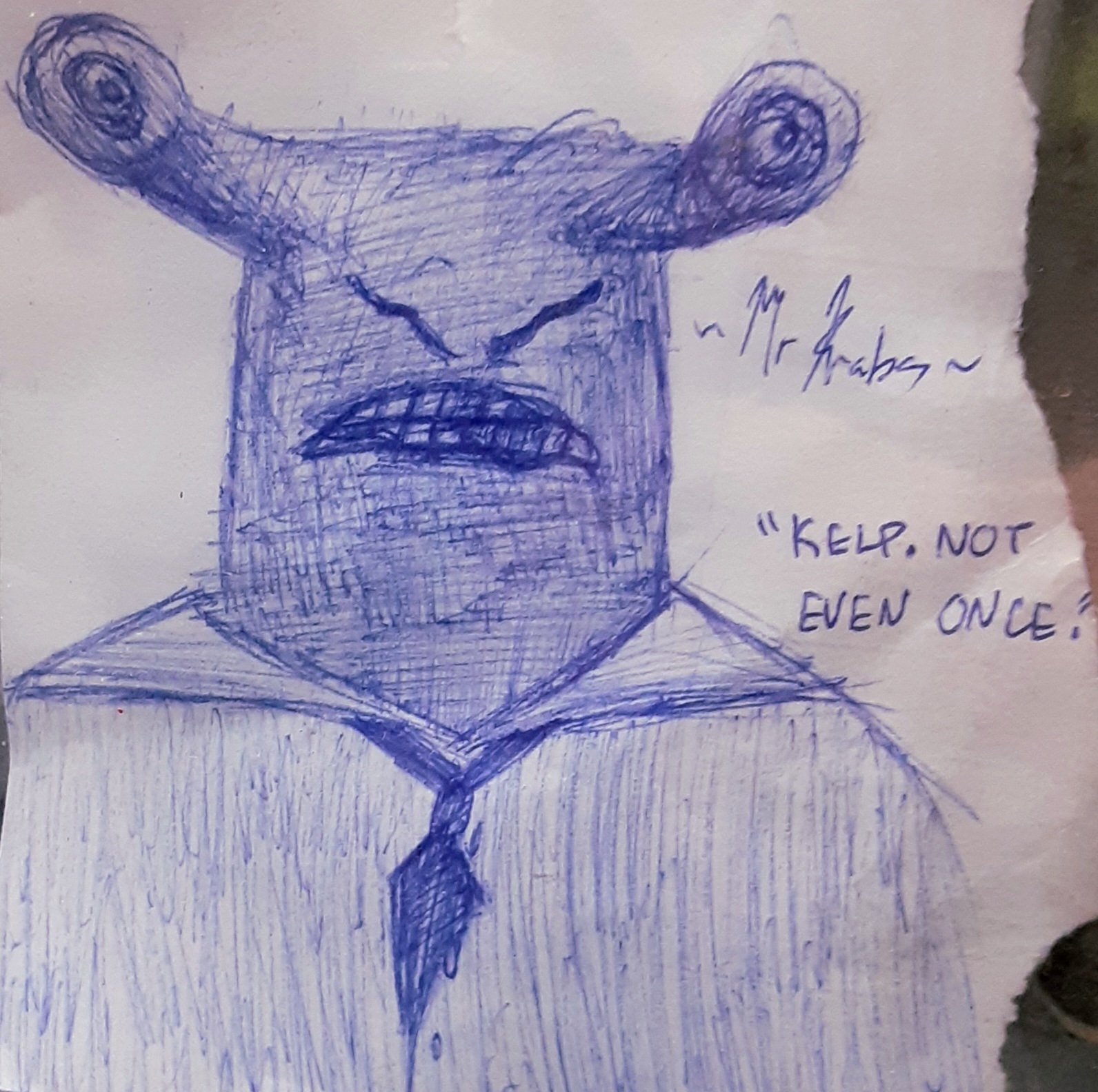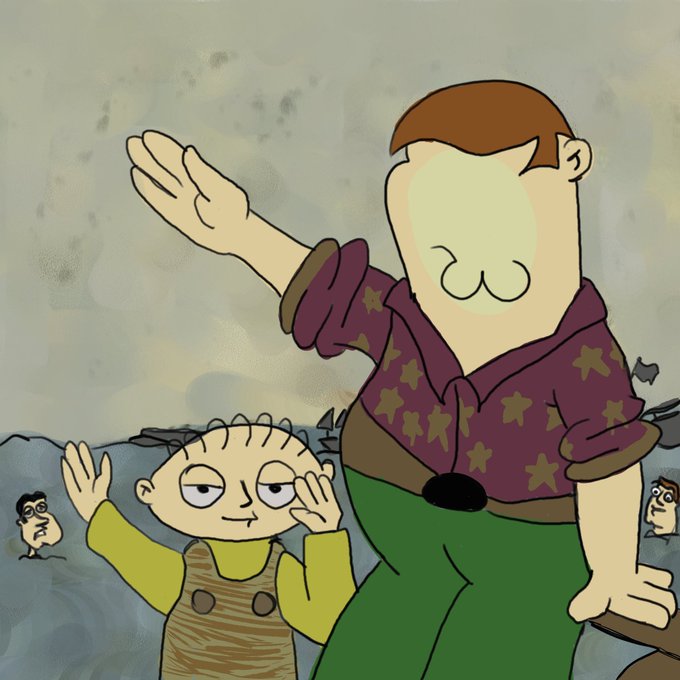“my, my! humans! so aggressive.”
rape, murder, nukes, war, torture, power, seemingly unlimited greed…
why don’t i have that insatiable drive?
can’t all be how i was raised, can it?
do you know of any studies or philosophical insights?
thx! 🙂
Lead exposure in childhood is one thing we know leads to poorer impulse control; that is to say, being short-sighted and selfish.
I have awful impulse control (severe ADHD) but usually I just eat an entire packet of Oreos instead of exploiting people for selfish reasons.
Imagine you were filthy rich and a country had all Oreos and would ban all exports and tourists. Sure you wouldn’t bribe a minister or two? Give a poor kid some money and exploit them to build an over the border Oreo smugglers ring …?!
That kind of comes down to values, though. Does a person value Oreos over honesty and integrity, or do they just enjoy Oreos? Someone might also enjoy most foods, they might prefer to fence, or they might prefer to knit.
TBH if I was filthy rich, I would help my loved ones, keep a decent retirement savings (reasonable), and then probably give the rest away. I would feel pretty bad keeping that kind of money if I knew that other people were starving and homeless. Happier people make for a better society too, imo.
That’s exactly the kind of long-term thinking to which lead exposure is deleterious.
Err, yeah, I wouldn’t do that, I’d just buy some other kind of snack!
And not to mention parents with high lead exposure who have anger issues, poor impulse control, etc. don’t make for good carers of small, loud and unpredictable children.

This is basically the old nature vs. nurture debate.
We all know of course the environment in which you grow up seriously influences your personality, however a surprising amount of human personality is attributed to genetics. There are case studies of twins separated at birth that will give you chills, as well as adoption studies where personalities of adopted children are more in alignment with their bio parents than the parents who raised them.
There are two personality “disorders” described in psychology that are commonly associated with the behaviors you’re describing. Antisocial personality disorder is characterized by a lack of empathy, disregard for cultural norms or rules, and engaging in behavior that harms others. Narcissistic personality disorder is characterized by a lack of empathy, a relentless focus on self-promotion and self-preservation without regard for how one’s actions affect others, and a drive to project power or status, no matter how real or imagined that power may be. Both of these disorders seem to have some degree of heritability associated with them, but it’s not super clear cut, and it’s likely that even with a genetic predisposition someone has to be brought up in a certain environment for the disorder to develop.
All this said, even more of human behavior is culturally and socially bound. Go back in time 1500 years, for example, and war, torture, execution, rape, and more were much more prevalent and socially acceptable than they are today. Even today there are cultures that tolerate more or less of each of these things.
This is my completely unsourced two cents
Anecdotally, in my old neighborhood, I knew of three families with a child adopted as an infant from from troubled circumstances. All three were raised together in the same household and with the same parenting as their non-adopted siblings. It’s a wealthy neighborhood, so the biological children ended up as studious, stable, high achievers.
The adopted kids, not so much. One worked at the store where I worked, and got fired eventually, since she was flaky, unable to focus on the job, and solicitous of any and all male attention. She showed up on the front page of local news sites one day because her parents reported her as a missing person. Turns out she went home with a guy she met at a bar and didn’t bother to tell anybody. Her co-workers were not surprised.
Another was my apartment neighbor, who was 19 and dating a 50-something guy. She couldn’t hold down a job, and he supported her. She eventually moved in with him, and told a homeless friend that he could move into the apartment her parents paid for. (He was a lot cleaner than the rabbit she barely cared for.) After she left, the fruit fly infestation in my apartment cleared up, and my landlord threw out the refrigerator from her unit rather than clean the maggots out of it.
The third was the worst. She got involved with a guy, hatched a plan for he and his friend to rob her parents, but the robbery went wrong and they murdered them instead.
The fact that all three turned out the polar opposite of the biological kids in the same environment sure points to some inborn traits.
Well it is an anecdote. Can’t draw any real conclusions there. Too many variables. How old were the kids when adopted? Were they abused or neglected or adopted right at birth? How well did the parents treat the adopted vs non-adopted kids? Were the adopted kids healthy at birth or could fetal alcohol syndrome have played a factor? Were there issues with discrimination based on race? And myriad other questions…
Crying babies who are yelled at, spanked and/or ignored, grow their fundamental brain structures around those experiences. Getting moved to loving homes won’t erase that.
There are a lot of studies that connect ADHD with early childhood trauma/abuse.
These are crazy stories! And valuable because they show a more well to do side than the usual. My experience with adopted and natural born kids being raised together comes from the other end of the socioeconomic ladder. My brother is a foster parent and they specialize in neonates and babies but also have adopted kids and the difference between their natural and adopted kids are pretty minimal. The kids are still young now but I don’t see any difference that would affect future life position outside of chance.
To me it sounds more like an environmental issue as this is what they all have in common.
I think it’s most to do with exactly how much wealth a person was born into.
Someone who is constantly on the verge of being homeless, possibly even starving, will very soon get desperate enough to do things they aren’t proud of to survive.
On the other hand, someone born into immense wealth will have very little understanding of people who are struggling. That’ll make it very hard for them to empathize. And with all that power, their sheer indifference will have them crushing the poor under their boots like ants. This is highly exacerbated by the fact that it is in their best interest to support policy that transfers wealth upwards.
Not sure if I fully agree. I’ve seen many people who grew up in luxury and safety who care a lot about the less fortunate in society. There’s also been many instances of 2 siblings growing up in a very similar environment, yet one is very empathic and altruistic and the other one turns out to be a selfish greedy person.
Not that I think you’re completely wrong though. What life you’re born into has a huge effect on who you become. Yet people seem to deal differently with the cards they’ve been handed.
If I look at me personally, I feel like it’s partially genetic, partially in what kind of household you grow up, and also partially your experiences while growing up. I was, for instance, quite “soft” for a guy which meant I got bullied by the more dominant and selfish people. I just wanted everyone to get along and didn’t want to hurt anyone, and because of that I constantly got kicked down. For me it’s turned me into someone who still wants everyone to get along, for everyone to get a chance. Yet it could’ve easily have fallen the other way, where I would’ve let the hate and resentment for other people get to me and turn me into a more self-centered and distrustful person. I feel like this often happens when people fall into the incel or alt-right movements. I think it’s mostly just a combination of how my brain works (genetic) and the support I had at home that kept me away from that. Had I gown up in an environment where my parents would’ve been more “rough” themselves, I’m not sure it’d have gone in the same direction.
My thoughts are similar, but I would consider the cause to be the lack of adversity and challenges. If you are brought up in a sheltered environment where every problem is handled by someone else, you don’t develop proper empathy or problem solving skills.
I feel like the ability to experience empathy to whatever degree is biological, but whether one actually sympathizes and acts compassionately is due to knowledge and experience.
An empathetic person could learn about something, sympathize, and decide to act compassionately. Or that same person could understand another’s plight and not sympathize for some reason, such as propaganda telling them that person deserves what they got. Or they might sympathize and not act compassionately due to negative consequences, socially, legally, or otherwise.
If effect, they’d act as a “bad person” but would not be a “bad” person deep down. Which would different from someone who cannot empathize (a psychopath) or someone who can empathize (understand), sympathize (feel the other’s pain), and decide not to be compassionate, which I’d categorize as sadistic.
For example, I have a feeling that some not insignificant number of people who might be called “transphobic” simply have no experience with or knowledege of actual trans people. Those with the ability to experience empathy to any significant degree would understand the plight
The anthropologist Sarah Blaffer Hrdy has theorized that empathy and altruism are acquired in early childhood by observing when one’s caretakers show empathy towards oneself, which both gives infants a sense of security in interacting with other people and which, because babies learn through observation and pattern recognition, establishes a standard in their minds that tells them humans are supposed to be selfless and kind to one another. This theory is relevant to us because, since most of us live in decaying neoliberal hellholes, many people’s parents are too busy working to give them appropriate care during their formative years and are not rich enough to pay for people who are qualified to do so in their stead. When it comes to people whose parents are rich, the selfishness that lead to them accumulating wealth could get passed on to their children by the same method. In other words, the conditions created by capitalism could be fucking with the ability of infants to become good people later in life
I think it’s all about empathy.
The ability to experience empathy, like any other trait varies at the biological level (and probably other levels as well). It only makes sense some would be born with little ability to experience empathy, some with so much empathy they worry about ants, but most people in the middle.
Those with little empathy (and therefore little sympathy or compassion, as those come from empathy) don’t allow morality to restrain their behavior so they tend to rise to power.
Most of the world’s problems are because people who are effectively psychopaths are in charge everywhere. The psychopaths have created a world through capitalism that pits us against each other and brings out the worst in us.
I don’t have an answer to you but if you like this sort of discussions/topics, I highly recommend the book Behave by Sapolsky.
thanks! :)
Yup. Nature aaaand nurture. There are countless studies and conversations and theories about this, but given the sheer number of variables and the very difficult question of “is anything you experience experienced the same way by others?”, there aren’t many definitive answers and no universal answers.
If you had the ability to push a button and divert $0.01 from a random million US bank accounts in a way that would leave no trace, would you press the button?
Power corrupts. Most people are not strong enough to resist the abuse of power. It starts very small - such a minor, harmless thing, but then you abuse power more and more to cover your tracks or to benefit yourself more.
I would guess a person’s life circumstances. Humans tend to reflect pain they’re experiencing onto others. If you’re hungry, that’s a form of pain. If you’re neglected, that’s a form of pain. Even the sons of billionaires experience pain, probably in a way that’s hard for reg folks to grasp.
Also, I think your dopamine regulation being all messed up might also contribute. Those people who seem to flail and rage because nothing can seem to satisfy them.
Also, everyone does terrible things and hurts others. You can be charitable and kind from one perspective and an oppressor in ways you won’t allow yourself to see. We all do it.
We know that people who have less tend to be more generous than people who have more.
Actually, it isn’t so much a matter of being rich vs being poor as it is the level of inequality that influences generosity. People who have more are about as likely as those who have less to be generous when inequality is low, and according to some studies they are actually even more likely to do so. But when inequality is high then the generosity of the wealthy decreases.
Thanks, I didn’t know. This is interesting: “…there might be something about the experience of elevated power and status that reduces our willingness to give to others.” Political realism on a micro scale?
A lot of those shitty things aren’t normal in humans, but become much more common if you force them into violent, existential conflicts.
And insatiable greed is promoted as good at almost every level of neoliberal society, so that one should be self-explanatory.
People just say “human nature” as an excuse for their own conservatism
Empathy is probably your best bet as far as a single variable goes. But otherwise we’re talking about something that’s incredibly complex on multiple levels, making it near impossible to address as a whole.
I like to envision human behavior and consciousness as a network of tensions and influences. (Perceived) material interests are one such tension, a particularly strong one. Strong enough that I feel confident saying that in general, people will tend to drift towards approximating an ethic that aligns with their material conditions.
The archetypes and behaviors modeled for us in our childhood and throughout our lives are a sort of structure that these forces interact with. We may have empathetic or selfish responses modeled for us by our parents, so those are the responses that spring to our minds when decisions arise. Good behavior modeling could mean the inherent tension towards self interest may be mediated or tempered by the limits of behavior we think to enact. Parents have a big impact on this early on, but so do later role models as well as media portrayals of people.
Social cohesion can be a big tension on people, incentivizing them to not act outside of group norms out of fear of being ostracized. Or on a more subconscious level, perhaps acting out of a “self” interest that benefits the social group, because the lines between Self and Other become blurred. Extending beyond the small self to consider the well-being of the large “Self”, sometimes even at the expense of the small self.
Critical theory may be of interest to you.
This guy wrote a book a long time ago which goes into this. Something about ‘material conditions’?
This is the answer, though many don’t like it.
I really like this question and it is one I think about a lot when daydreaming since having kids. When would I know if they’ve gone bad? If they do end up antisocial or narcissistic will I be able to point to a situation or chain of events that caused it? Will I even know?
Don’t have kids. Global fresh water reserves will be 40% over capacity by 2030, and 90% of global top soil and arable land is at risk of depletion by 2050.
And that’s just water and food, add climate collapse and fascism, and billions of people are going to die in the next 30 years.
This is not a world you should be looking at and thinking about adding more lives to.











